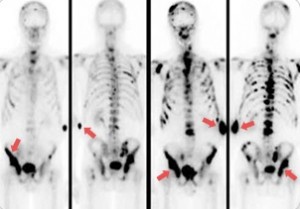In advanced stages of prostate cancer, it can metastasize to various regions of the body, most commonly the lymph nodes and bone. Tumor cell interaction with the surrounding microenvironment plays an important role in prostate cancer metastasis. Approximately 90% of patients with prostate cancer have bone metastasis at the time of death. Once prostate cancer cells spread to the bone, currently, no treatment regimens are available to eradicate the metastasis, and cancer-related death becomes inevitable. Thus, prostate cancer bone metastasis-associated clinical complications and treatment resistance pose major clinical challenges.
 The bones that are most commonly involved are vertebrae, sternum, pelvic bones, ribs, and femurs. Metastatic prostate cancer cells tend to make the bones around them thicker and denser, whereas other …
The bones that are most commonly involved are vertebrae, sternum, pelvic bones, ribs, and femurs. Metastatic prostate cancer cells tend to make the bones around them thicker and denser, whereas other …
Lectins are carbohydrate (sugar)-binding proteins (not to be confused with glycoproteins, which are proteins containing sugar chains or residues). Lectins have been found in plant, viruses, microorganisms and animals. Lectins serve many different biological functions in animals, from the regulation of cell adhesion to glycoprotein synthesis and the control of protein levels in the blood. They have been classified according to their carbohydrate-binding specificity. They may also bind soluble extracellular and intercellular glycoproteins.
Carbohydrates are defined as organic compounds composed of carbon, hydrogen, and oxygen that are organized into ring structures. Lectin-carbohydrate (cellular glycoconjugate) recognition is operative in biochemical information transfer. Changes in glycan structures and the interactions of these structures with endogenous carbohydrate-binding lectins are now considered to be potential biomarkers on cancer cells for monitoring tumor progression.
Tumor cells have …
Cancer cells are distinct from normal body cells based partly on their unique metabolic status, one element of which is an unusual requirement for fatty acid synthesis. Fatty acids are the major constituents of membrane lipid. Cellular proliferation requires fatty acids for synthesis of membranes and signaling molecules. Thus rapidly- proliferating cancer cells often have a robust program of fatty acid synthesis accompanied by high-level expression of associated genes such as fatty-acid synthase (FASN). FASN is over-expressed in many cancers. Increased lipid biosynthesis and desaturation are key requirements for tumor cell survival and proliferation.
Fatty acids are chains of carbons with attached hydrogen molecules at one end and an acid group (carboxylic acids) at the other end. Long-chain fatty acids are types of fats that have several carbons in their chain …